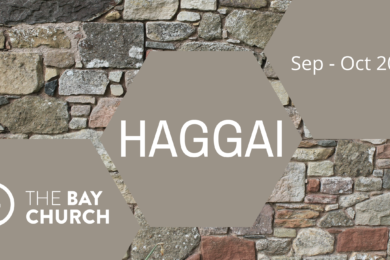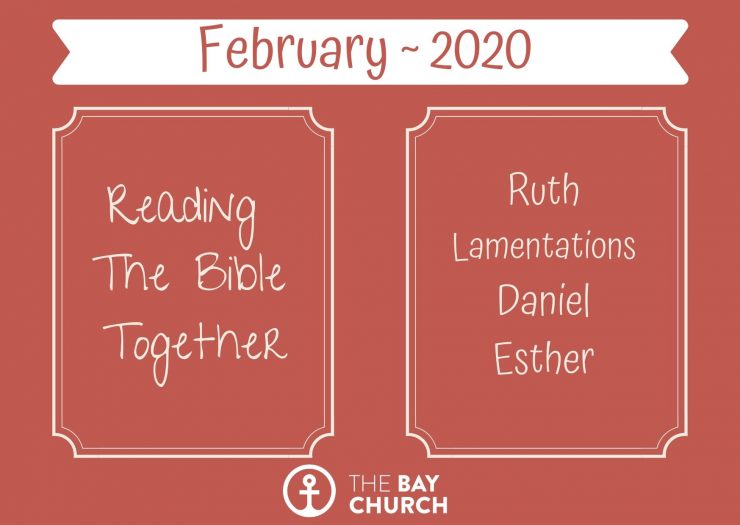February 2020
This month we have four Old Testament books to explore together; Ruth, Lamentations, Daniel and Esther. On this page we will provide overviews of those four books to help you as you read along. The four books on the face of it might seem a random collection, is there anything that joins them?
Three of our four books this month are collectively called ‘The Scrolls’ (sometimes The Megilloth). The books that make up ‘the scrolls are The Song of Songs, Ruth, Lamentations, Ecclesiastes and Esther. These books became important in Jewish history as each was linked to the major feasts of the Jewish calendar.
As you can see three of those books are being read this month. Daniel has also been added due in part to its length and no doubt because it shares the chronology of Esther and Lamentations. First up is Ruth.
Ruth
Ruth is a delightful, goldmine of a book. It is a very short book, but don’t be fooled, this is a book that packs a punch, no word has been wasted. It is a finely crafted story of one woman Naomi and her story of decline, darkness, and deliverance. Far more than a mere human story however we are reading of how God deals with his people.
Things to look out for in Ruth
Covenant Commitment:
Some of the most famous verses in the book are spoken by Ruth the Moabite as she commits herself to her Mother-in-law following the death of her husband.
“where you go I will go, and where you lodge I will lodge. Your people shall be my people, and your God my God. Where you die I will die, and there will I be buried. May the Lord do so to me and more also if anything but death parts me from you”
Ruth here uses language reminiscent of God’s covenant with his people, she is committing to Naomi who can offer her nothing as God has committed himself to his people. In the book we see the love of God his hesed, faithful lovingkindness displayed in the lives of his people.
Costly Commitment
In Boaz we see astonishing kindness shown to Ruth and Naomi, he provides for them, he gives them food and supplies from his own resources to care for them. He uses his wealth to help lift them from poverty. He is a worthy man, a godly man, displaying God’s generosity to the widow and the vulnerable foreigner. His commitment to them costs him, but he’s glad to do it.
Selfless commitment:
In the third chapter Boaz commends Ruth for the second time, he tells her “May you be blessed by the Lord, my daughter. You have made this last kindness greater than the first” (3:10) Her commitment to the family, to Naomi at this stage in the story is greater even than her initial commitment. Ruth is not pursuing her best but Naomi’s.
The Gospel in Ruth
Shocking Grace
Throughout the book you will notice that Ruth is often refereed to as Ruth the Moabite. This is being hammered home. Moab was a great enemy of Israel, a nation God has told Israel to have nothing to do with. That a Moabite is being received and blessed by God and his people tells of God’s great desire to bless all the nations of the world.
Redeemer:
Boaz is the most obvious Redeemer in the book, he is a cousin and fulfils the Redeemer obligations which though costly to him, rescues the family name. But there are other Redeemers Ruth is herself a provider, a rescuer of her mother-in-law Naomi. And baby Obed to offers his won redemption at the end of the book.
National Picture:
The book begins, ‘In the days when the judges ruled’ It ends with a genealogy of King David. The story of Ruth has seen us zoom in with God’s dealing with one wandering Israelite family, in doing so we have seen how God has brought hope to the whole nation through King David. We can zoom out again and look ahead to David’s greater Son Jesus – the Great Redeemer.
Bay Church Reflections
We have recently had an evening series on the book of Ruth. Not all of the audio was captured but you will find a number of messaged here that will help you get to grasp with the book.
Our Children’s Talk’s during the morning Meetings will also focus on this book. Introductory Sermon – Sunday 3rd
- Bay Church Sermon Series – https://thebaychurch.org.uk/sermons/ruth/
- Children’s Address during Morning Meeting. – Sunday 2nd, 9th, 16th, 23rd
Resources
The following video from The Bible Project may also provide a helpful overview. https://thebibleproject.com/explore/ruth/
There are a number of books available in the Bay Church Library on the book of Ruth, if you would like to borrow one please just ask.
- Faithful God, Sinclair Ferguson
- The Book of Ruth (NICOT), Robert Hubbard
- Barry G Webb, Five festal garments: Christian reflections on the Song of Songs, Ruth, Lamentations, Ecclesiastes, Esther
John Piper has also written a book on Ruth (A Sweet And Bitter Providence) you can read it on PDF for free here (John Piper on Ruth)
Questions
If you have any questions about the book of Ruth as you read please contact Andrew: andrew@thebaychurch.org.uk
Introduction to Lamentations
An amazing book.
In all poetry, the message is not only in what the poet says but also in how he says it. A disintegrating society produces disintegrated poetry: but Lamentations is different. This poet depicts chaos and devastation with the most carefully crafted poetry in the OT. So he seems to contradict the facts he describes by the form in which he describes them.
The five poems describe absolute ruin: 586 BC seemed to be the end of the nation, the kingdom, the succession of kings from David, the Temple and all the promises of God. But the poet still writes for future generations. So he contradicts the facts he describes by the faith he expresses in a faithful God.
The fact that he writes, and writes with such meticulous technique, shows that he expects a future.
Why don’t we read Lamentations?
- “It’s difficult” – it’s not. Poetry was designed to make a strong impression on our senses and emotions.
- “The title makes it look miserable” – but it’s not. It is a book with a mixture of despair and hope, and hope wins.
- “We don’t know the history” – it fits in with what we have recently read in 2 Kings.
- “We can’t see what it has to say to us today” – all Scripture is “profitable for teaching, for reproof, for correction, and for training in righteousness” [2 Timothy 3:16].
Who wrote it?
It does not say but it has always been connected with Jeremiah. He experienced the destruction of Jerusalem and wrote about it, sometimes poetically, in the Book of Jeremiah. The Greek translation of the Old Testament [the Septuagint or LXX] calls it ‘the tears of Jeremiah’.
When was it written?
Soon after the destruction of Jerusalem [including the Temple] by the Babylonians in 586 BC.
After the good king Josiah was killed in 509 BC, the final kings of Judah were Jehoahaz, Jehoiakim, Jehoiachin, Zedekiah – all faithless. Judah was defeated and partly exiled in 605 [Daniel was taken captive] and 596 [Ezekiel was taken captive].
You can read the historical account in 2 Kings and 2 Chronicles. The sufferings of war and conquest give birth to the vivid, eyewitness detail of Lamentations.
The poetry of Lamentations?
[1] Five poems.
Every chapter in English has 22 verses or 66.
Chapters 1-4 are acrostic, i.e. the verses start with the successive letters of the Hebrew alphabet.
Each verse in chapters 1 and 2 has three lines.
Chapter 3 has groups of three lines / verses for each letter of the alphabet.
Each verse in chapters 4 and 5 has two lines.
[2] Five poems with different ‘speakers’.
1.1-11: the poet’s description; 1:12-22 Jerusalem speaks.
2.1-17: the poet’s description; 2:18-19 a call to prayer; 2:20-22 Jerusalem cries out to God.
3: one man’s grief: e.g. 3:1.
4: mainly the poet’s description; but 4:17-20 “we” and 4:21-22 a curse on Edom.
5: a prayer addressed to God.
[3] Various poetic skills.
[a] Parallelism, i.e. second line repeats or expands first line with different words: e.g. 5:19:
But you, O Lord, reign forever;
your throne endures to all generations.
[b] Rhythm. In Hebrew the rhythm is often like a dirge: short, sobbing lines, e.g. 2:11.
[c] Contrasts the past and present: 4:1-2.
Helpful books
- Barry Webb, Five festal garments.
- R K Harrison, Jeremiah and Lamentations, Tyndale Old Testament Commentary.
Questions
If you have any questions about the book of Lamentations as you read please contact Andrew: andrew@thebaychurch.org.uk





